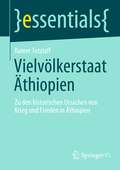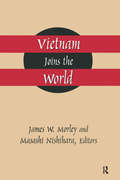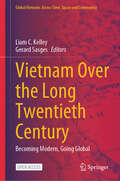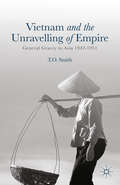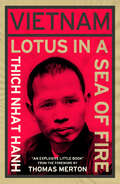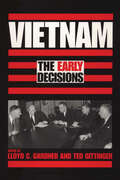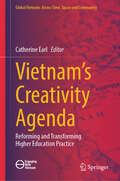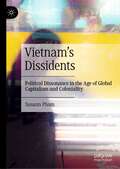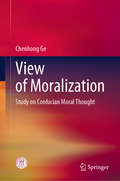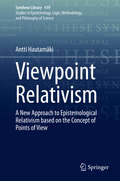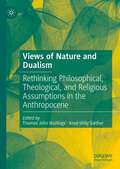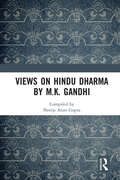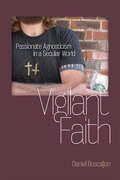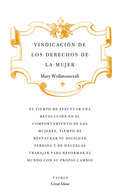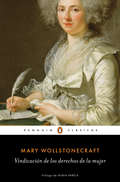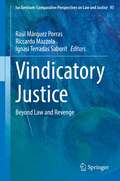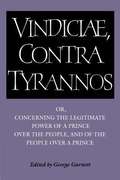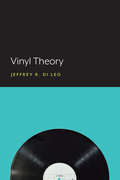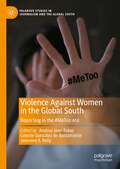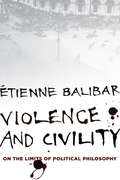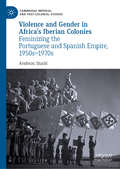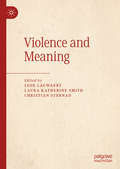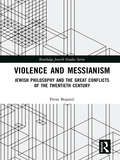- Table View
- List View
Vielvölkerstaat Äthiopien: Zu den historischen Ursachen von Krieg und Frieden in Äthiopien (essentials)
by Rainer TetzlaffDas Essential analysiert die historischen Ursachen von Krieg und Frieden in Äthiopien im Kontext von Reichsgründung und Modernisierung seit der Mitte des 19. Jahrhunderts. Es stellt die aktuellen Rivalitäten zwischen den Völkern der Tigray, Eritreer, Amharen und Oromo seit der Abschaffung der Monarchie 1974 in den Vordergrund und diskutiert die politischen Aussichten auf Frieden und interethnische Versöhnung unter der Herrschaft des amtierenden Premierministers Abiy Ahmed – Friedensnobelpreisträger und Kriegsherr zugleich.
Vietnam Joins the World: American and Japanese Perspectives
by James Morley Masashi NishiharaTen American and Japanese specialists offer a comprehensive analysis of one of the most dramatic developments in Asia today: the re-emergence of Vietnam - not as the belligerent champion of a militant ideology and socialist cause, but as an open, friendly country seeking a respected place in the world community. Basing their observations on five years of study, visits to Vietnam, and numerous interviews with knowledgeable officials, scholars and businessmen there and in the United States and Japan, the authors evaluate the political, ecnomic, social and foreign policy changes that have been taking place in Vietnam over the past decade, trace the responses of the United States and Japan and offer a policy prescription for responding to the challenges of the future.
Vietnam Over the Long Twentieth Century: Becoming Modern, Going Global (Global Vietnam: Across Time, Space and Community)
by Liam C. Kelley Gerard SasgesThis open access book provides fascinating insights into the incredible changes that Vietnam underwent in the long twentieth century as it transformed from an early modern kingdom to a European colony, to a divided land with opposing ideologies, and to a unified country in a globalized world. At each stage in this long century of changes, there were Vietnamese who sought to mold their society into some vision of “modernity.” The book looks at multiple, rather than one form of modernity, and links those forms with the different political moments that Vietnam experienced, in tandem with the outside interlocutors that were maintained during those periods. As such, this book provides a holistic view of the many forms of modernity and their global links that can be found in Vietnam over the course of the long twentieth century. These multiple modernities are documented in this book, and the authors do so by bringing together the strengths of “traditional” language-based area studies scholarship with the insights that an awareness of trans-national and global perspectives provides. Relevant to historians and researchers in the broader arena of Southeast Asian studies with a particular interest in Vietnam—its journey from past to present—this book is a must-read engagement with a country that has undergone and continues to experience, rapid transformation.
Vietnam and the Unravelling of Empire: General Gracey in Asia 1942-1951
by T. SmithThe Vietnam War and Indian independence devastated British policy towards Asia. The Labour Government failed to understand its commitments. Yet some senior British officers were prepared to work alongside Asian nationalism in order to secure British interests. This created a radical local fusion of imperial, diplomatic and humanitarian policies.
Vietnam: A Buddhist Proposal for Peace
by Thich Nhat HanhThis stunning commentary on the cultural and political background to the war in Vietnam resonates deeply as the first work of Vietnamese writer, peace activist, and Buddhist monk Thich Nhat HanhThis rare book from 1967 is one of the very few written in English giving a Vietnamese perspective on the Indochina Wars. Many years ahead of its time, Vietnam: Lotus in a Sea of Fire will be welcomed by historians and readers of contemporary Vietnamese narratives. As war raged in Vietnam, the Zen monk Thich Nhat Hanh became a leading figure in the Buddhist peace movement. With the help of friends like Catholic monk Thomas Merton, he published Vietnam: Lotus in a Sea of Fire in 1967 in the US (and underground in Vietnam as Hoa Sen Trong Biển Lửa), his uncompromising and radical call for peace. It gave voice to the majority of Vietnamese people who did not take sides and who wanted the bombing to stop. Thomas Merton wrote the foreword, believing it had the power to show Americans that the more America continued to bomb Vietnam, the more communists it would create. This was Thich Nhat Hanh's first book in English and made waves in the growing anti-war movement in the United States at the time. Thich Nhat Hanh's portrayal of the plight of the Vietnamese people during the Indochina Wars is required reading now as the United States and Europe continue to grapple with their roles as global powers—and the human effects of their military policies. Vietnam: Lotus in a Sea of Fire is of special interest for students of peace and conflict studies and Southeast Asian history. It also gives the reader insights into the thought of the young Thich Nhat Hanh, who would later go on to found--in exile--Plum Village in France, the largest Buddhist monastery outside Asia, and influence millions with his teachings on the path of peace and mindfulness.
Vietnam: The Early Decisions
by Lloyd C. Gardner and Ted GittingerThis anthology examines the turmoil and conflicting advice that led the US into Vietnam and the roles played by Presidents Kennedy and Johnson. For many Americans, Oliver Stone&’s film JFK left no doubt that before his assassination Kennedy had determined to quit Vietnam. Yet the historical record offers a more complex view. In this fresh look at the archival evidence, noted scholars take up the challenge to provide us with their conclusions about the early decisions that put the United States on the path to the greatest American tragedy since the Civil War. The book is divided into four sections. Parts one and two delve into the political and military contexts of the early decisions. Part three raises the intriguing questions of Kennedy&’s and Johnson's roles in the conflict, particularly the thorny issue of whether Kennedy did, in fact, intend to withdraw from Vietnam and whether Johnson reversed that policy. Part four reveals an uncanny parallel between early Soviet policy toward Hanoi and US policy toward Saigon.
Vietnam’s Creativity Agenda: Reforming and Transforming Higher Education Practice (Global Vietnam: Across Time, Space and Community)
by Catherine EarlThis book gathers a diverse set of empirical research chapters from practitioners in the higher education sector in Vietnam to explore the effects of higher education reform on university learning and teaching from the point of view of the classroom educators. Through action research, reflective practice, and other qualitative methods, the book investigates the transformations of learning and teaching practice from top-down to bottom-up, teacher-centred to student-centred, curriculum-oriented to skills-based, institutionally directed to partner integrated, and co-designed approaches. In doing so, the book challenges a rethinking of Vietnamese higher education. It reveals the ingredients for transformative education and calls for educators to be empowered with support, resources, and trust. Drawing on a broad range of disciplinary backgrounds about Vietnam’s university reforms, it is highly relevant to social anthropologists, educational specialists, and policymakers working in higher education reform, not only in Vietnam and other Southeast Asian contexts, but globally.
Vietnam’s Dissidents: Political Dissonance in the Age of Global Capitalism and Coloniality
by Susann PhamThis book is the first ethnography on Vietnam’s contemporary dissident movement. As a country that became known and is still remembered as one of the last remnants of Communist revolutions, Vietnam has managed to lift itself from one of the poorest war-torn post-colonies to one of the fastest growing market economies in Southeast Asia. Yet, while holding on to the legacy of a communist-led liberation movement, the present-day Communist Party of Vietnam (CPV) finds itself subject to political challenges from below. In recent years, dissident voices critical of the party-state's malgovernance over social, economic and environmental issues have mushroomed across classes, generations and provinces. Based on extensive ethnographic data, this book explores distinct political practices and political ideas of Vietnam's dissidents. It examines different anti-capitalist and anti-authoritarian practices of democracy, labour, peasant and religious activists and reveals that anti-capitalist and anti-authoritarian practices are—at times—motivated by nationalist, anti-communist and statist ideas and ideologies. Understanding this dissonance between political practices and political ideas within the context of global capitalism and coloniality lies at the heart of this book.
View of Moralization: Study on Confucian Moral Thought
by Chenhong GeThis book summarizes the author’s extensive research on Confucian morality issues and focuses on elaborating the extremely important and unique role of moral thought in Confucian ideology. The book shares the author’s own standpoints on a range of issues – including where moral thoughts originated, what the major principles are, and what methods were adopted in Confucianism – to form a comprehensive and in-depth interpretation, and help readers achieve a better understanding.Moreover, the book focuses on the similarities and differences between Chinese and western cultures and presents an in-depth analysis of the differences and roots regarding various aspects, including Chinese and western historical development paths, thoughts and cultures, national spirits, national mentalities, and social governance models. The formation of either culture has its own practical reasons and historical roots. The book represents a major contribution, helping readers understand the similarities and differences between Chinese and western cultures and social civilizations, enabling them to integrate and learn from Chinese and western cultures, and promoting a better development for Chinese society and the international community alike. Combining detailed data and an approachable style, it contributes to the legacy of Confucianism by applying a critical attitude. The author thinks out of the box in terms of theoretical analysis and studies on certain issues. As such, the book will be of great academic value in terms of studying China’s ideological culture, especially its morality culture, and will benefit scholars and research institutions alike.
Viewpoint Relativism: A New Approach to Epistemological Relativism based on the Concept of Points of View (Synthese Library #419)
by Antti HautamäkiThis book offers new insights into truth, knowledge, and reality. It details a unique approach to epistemological relativism based on the concept of points of view. In a point of view, an aspect represents an object for a subject. By applying this concept of points of view, the author develops a consistent and adequate form of relativism, called viewpoint relativism, according to which epistemic questions like “Is X true (or justified or existing)” are viewpoint-dependent. The monograph examines central issues related to epistemological relativism. It analyzes major arguments pro and con from different opinions. The author presents the arguments of well-known philosophers. These include such thinkers as Paul Boghossian, John Dewey, Nelson Goodman, Martin Kusch, C.I. Lewis, John MacFarlane, Hilary Putnam, W.V.O. Quine, Richard Rorty, John Searle, and Ludwig Wittgenstein. In the process, the author deconstructs the standard account of correspondence theory of truth. Viewpoint relativism is a moderate relativism, which is not subjected to standard criticism of extreme relativism. This book argues that knowledge creation presupposes openness to different points of view and their comparison. It also explores the broader implications of viewpoint relativism into current debate about truth in society. The author defends a critical relativism, which accepts pluralism but is critical against all points of view. In the conclusion, he explores the relevance of viewpoint relativism to democracy by showing that the main threat of modern democratic society is not pluralism but absolutism and fundamentalism.
Views of Nature and Dualism: Rethinking Philosophical, Theological, and Religious Assumptions in the Anthropocene
by Knut-Willy Sæther Thomas John HastingsIn the face of the anthropogenic threats to the singular planetary habitat we share with other human beings and non-human species, humanities scholars feel a renewed sense of urgency 1) to acknowledge the ways our species has funded particular histories of environmental exploitation, alienation, and collapse, 2) to unpack inherited assumptions that impact our views of nature and interspecies relations, and 3) to suggest ways of thinking and acting that seek to repair the damage and promote mutual flourishing for all of earth inhabitants. This volume brings together scholars in philosophy, theology, and religion who take up this urgent ethical task from a broad range of perspectives and locations.
Views on Hindu Dharma by M.K. Gandhi
by Neerja Arun GuptaMohandas Karamchand Gandhi took pride in calling himself a Sanatani Hindu. He lived by what he professed. Indeed, he spiritualized his entire political existence and his very opinion, world view and discourse was weighted with morality and ethics born of Hindu Dharma.This timely compilation of Mahatma Gandhi’s views on Hindu Dharma is a remarkable and systematically arranged compendium of his ideas on every aspect of India’s social and political life.Gandhi’s views – disseminated through many short essays in Harijan and other journals of his time – on Sanatan Dharma, idol worship, Rama as a God, compulsory teaching of Gita in schools, conversion, cow-slaughter and protection, varnashramas, untouchability and other aspects are presented here in his own words.This volume is indispensable for scholars of Modern South Asian History, Gandhian Thought, Colonialism and Religious Studies. Please note: Taylor & Francis does not sell or distribute the Hardback in India, Pakistan, Nepal, Bhutan, Bangladesh and Sri Lanka
Vigilant Faith: Passionate Agnosticism in a Secular World (Studies in Religion and Culture)
by Daniel BoscaljonIn Vigilant Faith: Passionate Agnosticism in a Secular World, Daniel Boscaljon takes up the contemporary challenges to faith by skepticism and secularism. He proposes a model of faith for believers and unbelievers alike—a passionate agnosticism—that is rooted in a skeptical consciousness. Skepticism and faith are structurally similar, he writes, in that they share an "unknowing" quality. The author argues that vigilance—the act of keeping watch, a spiritual practice in its own right—is as necessary a precondition for the structure of faith as it is for the structure of skepticism. A suspension in uncertainty and an openness to possibility require vigilance, he attests, if faith and skepticism are to avoid the often dogmatic tendencies of both theism and atheism to cling to their own brands of certainty and knowledge.Boscaljon has three aims: to expand the current, post-theistic definitions of God for greater relevance to human beings on an individual and existential level; to integrate skepticism into faith so that it will restore the importance of faith to current theology and recover it from anti-intellectual bias; and to conceptualize the vigilance of faith in such a way that can provide a vocabulary for distinguishing "good faith" from "bad faith." He offers a variety of cultural examples ranging from film to poetry to represent a life of faith and to show how its components come together in practice. As an alternative to the prevailing fundamentalisms in today's world, his book proposes a paradigmatic understanding of faith in which theism, atheism, and agnosticism refuse to differ.
Vilém Flusser: An Introduction (Electronic Mediations)
by Rainer Guldin Anke Finger Gustavo BernardoVilém Flusser (1920–1991) has long been known and celebrated in Europe and Brazil primarily as a media theorist. Only recently have other facets of his accomplishments come to light, clearly establishing Flusser as a key thinker. An accessible and thorough introduction to Flusser&’s thought, this book reveals his engagement with a wide array of disciplines, from communication studies, posthuman philosophy, media studies, and history to art and art history, migrant studies, anthropology, and film studies. The first to connect Flusser&’s entire oeuvre, this volume shows how his works on media theory are just one part of a greater mosaic of writings that bring to the fore cultural and cognitive changes concerning all of us in the twenty-first century.A theorist deeply influenced by his experiences as a privileged citizen of Prague, a Jew pursued by the Nazis, a European emigrant, a Brazilian immigrant, and a survivor keenly interested and invested in history and memory, Vilém Flusser was an outsider in a staunchly hierarchical and disciplined academic world.
Vindicación de los derechos de la mujer (Serie Great Ideas #Volumen 19)
by MARY WOLLSTONECRAFTIdeas que han cambiado el mundo. A lo largo de la historia, algunos libros han cambiado el mundo. Han transformado la manera en que nos vemos a nosotros mismos y a los demás. Han inspirado el debate, la discordia, la guerra y la revolución. Han iluminado, indignado, provocado y consolado. Han enriquecido vidas, y también las han destruido. Taurus publica las obras de los grandes pensadores, pioneros, radicales y visionarios cuyas ideas sacudieron la civilización y nos impulsaron a ser quienes somos. Esta apasionada declaración de independencia de la mujer escrita por Mary Wollstonecraft hizo añicos el estereotipo de la dama dócil y ornamental, anticipando una nueva era de igualdad y consagrando a su autora como fundadora del feminismo moderno. Comentarios sobre la colección Great Ideas:«De veras que la edición es primorosa y pocas veces contenido y continente pueden encontrarse mejor ensambladosy unidos. ¡Qué portadas! Para enmarcar. [...] Ante las Great Ideas, solo cabe quitarse el sombrero. ¡Chapeau!»ABC «Taurus propone un doble envite con este lanzamiento. Por un lado aumenta su compromiso con el ensayo; por otro, recupera el gusto por la estética. A los volúmenes se les ha proporcionado una portada delicada y cuidada (copian el original británico) que invita a la lectura.»La Razón «Un fenómeno editorial.»The Guardian «Aparte de los contenidos, en general muy bien elegidos, son tan bonitos que si los ven seguro que cae alguno.»El País «Ideas revolucionarias, crónicas de exploraciones, pensamientos radicales vuelven a la vida en estas cuidadísimas ediciones, muy atractivas para nuevos lectores.»Mujer Hoy «Grandes ideas bien envueltas. De Cicerón a Darwin, esta colección entra por los ojos.»Rolling Stone «Original y bella iniciativa la emprendida por Taurus con su colección Great Ideas.»Cambio 16 «Hay libros inmortales, libros únicos que contienen pensamientos y reflexiones capaces de cambiar el mundo, tesoros en miniatura reagrupados en la colección Great ideas.»Diario de León
Vindicación de los derechos de la mujer (Tribuna Feminista Ser. #Vol. 18)
by MARY WOLLSTONECRAFT«No deseo que las mujeres tengan podersobre los hombres, sino sobre sí mismas.» Una nueva edición que incluye el prólogo de Nuria Varela. El término feminismo no existía cuando Mary Wollstonecraft escribió este libro, que fue, sin embargo, la primera gran obra de la literatura feminista. En una época en la que la defensa de los derechos humanos había llevado la revolución a América y a Francia, Mary Wollstonecraft produjo su propia declaración de independencia en 1792. Vindicación de los derechos de la mujer atacó la idea dominante de una feminidad dócil y decorativa, y sentó los principios de la emancipación femenina. En estas páginas encontrarás la esencia de sus ideas, a favor de la educación de las mujeres y de su contribución a la sociedad. Racionalista y revolucionaria a la vez, y sin más poder que su pluma, Mary Wollstonecraft puso en marcha el movimiento que cambiaría el mundo para siempre y que, más de dos siglos después, continúa transformándolo. Prólogo de NURIA VARELA Traducción de MARTA LOIS GONZÁLEZ Comentarios sobre la colección Great Ideas:«De veras que la edición es primorosa y pocas veces contenido y continente pueden encontrarse mejor ensamblados y unidos. ¡Qué portadas! Para enmarcar. [...] Ante las Great Ideas, solo cabe quitarse el sombrero. ¡Chapeau!»ABC «Taurus propone un doble envite con este lanzamiento. Por un lado aumenta su compromiso con el ensayo; por otro, recupera el gusto por la estética. A los volúmenes se les ha proporcionado una portada delicada y cuidada (copian el original británico) que invita a la lectura.»La Razón «Un fenómeno editorial.»The Guardian «Aparte de los contenidos, en general muy bien elegidos, son tan bonitos quesi los ven seguro que cae alguno.»El País «Ideas revolucionarias, crónicas de exploraciones, pensamientos radicales vuelven a la vida en estas cuidadísimas ediciones, muy atractivas para nuevos lectores.»Mujer Hoy «Grandes ideas bien envueltas. De Cicerón a Darwin, esta colección entra por los ojos.»Rolling Stone «Original y bella iniciativa la emprendida por Taurus con su colección Great Ideas.»Cambio 16 «Hay libros inmortales, libros únicos que contienen pensamientos y reflexiones capaces de cambiar el mundo, tesoros en miniatura reagrupados en la colección Great ideas.»Diario de León
Vindicatory Justice: Beyond Law and Revenge (Ius Gentium: Comparative Perspectives on Law and Justice #93)
by Raúl Márquez Porras Riccardo Mazzola Ignasi Terradas SaboritThis volume offers a new theoretical approach to the analysis of the law/revenge binary, and attempts to dismantle the common idea of revenge as lacking any legal, moral or rational dimension. In contrast, the book puts forward a model of a complex system of justice—which it terms 'vindicatory'—wherein vendetta constitutes an authorized action, the core of which does not (just) lie in vengeance but also in settlement procedures for peace—or 'composition.' The first part of the book ("Vindicatory Justice: Conceptual Analyses and Forerunners") seeks to identify the nature of vindicatory justice and to shed light on the structure of so-called vindicatory systems. In turn, the second part ("Mapping Vindicatory Justice") illustrates, using examples gathered from a range of sociolegal contexts, the dynamic relationship between composition and authorized revenge in vindicatory systems. Taken as a whole, the volume shows that applying a longue durée historical perspective to the study of revenge systems allows us to clearly recognize composition and authorized revenge as features of the same legal system, even though one of them may seem predominant (or more eye-catching) than the other in certain cultural settings.
Vindiciae, Contra Tyrannos: Or, Concerning the Legitimate Power of a Prince Over the People, and of the People Over a Prince (Cambridge Texts in the History of Political Thought)
by Stephanius Jurius Brutus George S. GarnettThe Vindiciae, contra tyrannos was the most infamous of the monarchomach treatises produced during the French wars of religion. This edition presents the first complete and accurate English translation of the work, a comprehensive apparatus, and an introduction that provides the first detailed analysis of the argument and also reconsiders the much-disputed question of authorship. It will be of interest to a wide range of scholars working on the history of political thought and early modern Europe.
Vinyl Theory
by Jeffrey R. Di LeoWhy are vinyl records making a comeback? How is their resurgence connected to the political economy of music? Vinyl Theory responds to these and other questions by exploring the intersection of vinyl records with critical theory. In the process, it asks how the political economy of music might be connected with the philosophy of the record. The young critical theorist and composer Theodor Adorno’s work on the philosophy of the record and the political economy of music of the contemporary French public intellectual, Jacques Attali, are brought together with the work of other theorists in order to understand the fall and resurrection of vinyl records. The major argument of Vinyl Theory is that the very existence of vinyl records may be central to understanding the resiliency of neoliberalism. This argument is made by examining the work of Adorno, Attali, Friedrich Nietzsche, and others on music through the lens of Michel Foucault’s biopolitics.
Violence Against Women in the Global South: Reporting in the #MeToo era (Palgrave Studies in Journalism and the Global South)
by Andrea Jean Baker Celeste González de Bustamante Jeannine E. RellyBringing together 14 journalism scholars from around the world, this edited collection addresses the deficit of coverage of violence against women in the Global South by examining the role of the legacy press and social media that report on and highlight ways to improve reporting. Authors investigate the ontological limitations which present structural and systemic challenges for journalists who report on the normalization of violence against women in country cases in Argentina; Brazil; Mexico; Indonesia; Kenya, Nigeria, South Africa; Egypt; Libya, Syria, and Yemen. Challenges include patriarchal forces; gender imbalance in newsrooms; propaganda and censorship strategies by repressive, hyper-masculine, and populist political regimes; economic and digital inequities; and civil and transnational wars. Presenting diverse conceptual, methodological, and empirical chapters, the collection offers a revision of existing frameworks and guidelines and aims to promote more gender-sensitive, trauma-informed, solutions-driven, and victim or survivor centered reporting in the region.
Violence All Around
by John SiftonA human rights lawyer travels to hot zones around the globe before and after 9/11 to document abuses by warlords, terrorists, and counterterrorism forces. John Sifton reminds us that human rights advocates can only shame the world into better behavior; to invoke rights is to invoke the force to uphold them, including the very violence they deplore.
Violence and Civility: On the Limits of Political Philosophy (The Wellek Library Lectures)
by Étienne BalibarIn Violence and Civility, Étienne Balibar boldly confronts the insidious causes of violence, racism, nationalism, and ethnic cleansing worldwide, as well as mass poverty and dispossession. Through a novel synthesis of theory and empirical studies of contemporary violence, the acclaimed thinker pushes past the limits of political philosophy to reconceive war, revolution, sovereignty, and class.Through the pathbreaking thought of Derrida, Balibar builds a topography of cruelty converted into extremism by ideology, juxtaposing its subjective forms (identity delusions, the desire for extermination, and the pursuit of vengeance) and its objective manifestations (capitalist exploitation and an institutional disregard for life). Engaging with Marx, Hegel, Hobbes, Clausewitz, Schmitt, and Luxemburg, Balibar introduces a new, productive understanding of politics as antiviolence and a fresh approach to achieving and sustaining civility. Rooted in the principles of transformation and empowerment, this theory brings hope to a world increasingly divided even as it draws closer together.
Violence and Gender in Africa's Iberian Colonies: Feminizing the Portuguese and Spanish Empire, 1950s–1970s (Cambridge Imperial and Post-Colonial Studies Series)
by Andreas StuckiThis book examines how and why Portugal and Spain increasingly engaged with women in their African colonies in the crucial period from the 1950s to the 1970s. It explores the rhetoric of benevolent Iberian colonialism, gendered Westernization, and development for African women as well as actual imperial practices – from forced resettlement to sexual exploitation to promoting domestic skills. Focusing on Angola, Mozambique, Western Sahara, and Equatorial Guinea, the author mines newly available and neglected documents, including sources from Portuguese and Spanish women’s organizations overseas. They offer insights into how African women perceived and responded to their assigned roles within an elite that was meant to preserve the empires and stabilize Afro-Iberian ties. The book also retraces parallels and differences between imperial strategies regarding women and the notions of African anticolonial movements about what women should contribute to the struggle for independence and the creation of new nation-states.
Violence and Meaning
by Lode Lauwaert Laura Katherine Smith Christian SternadThis edited collection explores the problem of violence from the vantage point of meaning. Taking up the ambiguity of the word ‘meaning’, the chapters analyse the manner in which violence affects and in some cases constitutes the meaningful structure of our lifeworld, on individual, social, religious and conceptual levels. The relationship between violence and meaning is multifaceted, and is thus investigated from a variety of different perspectives within the continental tradition of philosophy, including phenomenology, post-structuralism, critical theory and psychoanalysis. Divided into four parts, the volume explores diverging meanings of the concept of violence, as well as transcendent or religious violence- a form of violence that takes place between humanity and the divine world. Going on to investigate instances of immanent and secular violence, which occur at the level of the group, community or society, the book concludes with an exploration of violence and meaning on the individual level: violence at the level of the self, or between particular persons. With its focus on the manifold of relations between violence and meaning, as well as its four part focus on conceptual, transcendent, immanent and individual violence, the book is both multi-directional and multi-layered.
Violence and Messianism: Jewish Philosophy and the Great Conflicts of the Twentieth Century (Routledge Jewish Studies Series)
by Petar BojanićViolence and Messianism looks at how some of the figures of the so-called Renaissance of "Jewish" philosophy between the two world wars - Franz Rosenzweig, Walter Benjamin and Martin Buber - grappled with problems of violence, revolution and war. At once inheriting and breaking with the great historical figures of political philosophy such as Kant and Hegel, they also exerted considerable influence on the next generation of European philosophers, like Lévinas, Derrida and others. This book aims to think through the great conflicts in the past century in the context of the theory of catastrophe and the beginning of new messianic time. Firstly, it is a book about means and ends – that is, about whether good ends can be achieved through bad means. Second, it is a book about time: peace time, war time, time it takes to transfer from war to peace, etc. Is a period of peace simply a time that excludes all violence? How long does it take to establish peace (to remove all violence)? Building on this, it then discusses whether there is anything that can be called messianic acting. Can we – are we capable of, or allowed to – act violently in order to hasten the arrival of the Messiah and peace? And would we then be in messianic time? Finally, how does this notion of messianism – a name for a sudden and unpredictable event – fit in, for example, with our contemporary understanding of terrorist violence? The book attempts to understand such pressing questions by reconstructing the notions of violence and messianism as they were elaborated by 20th century Jewish political thought. Providing an important contribution to the discussion on terrorism and the relationship between religion and violence, this book will appeal to theorists of terrorism and ethics of war, as well as students and scholars of Philosophy, Jewish studies and religion studies.
